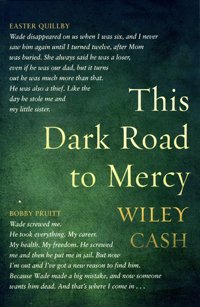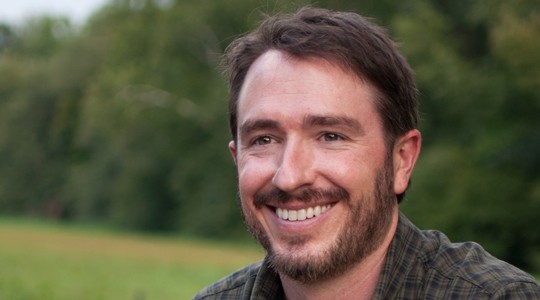Wiley Cash is a native of North Carolina who now lives in West Virginia. His debut novel was A Land More Kind Than Home, where he dealt with religious obsession, childhood, disability, and a certain kind of rural deprivation. The book was enthusiastically received by readers of both fine literature and crime fiction. Cash won the CWA John Creasey New Blood Dagger in 2012, and was also shortlisted for the 2012 CWA Gold Dagger for Best Crime Novel of the Year. Here on Crime Fiction Lover, it was my own book of the year for 2013. Cash is walking in the footsteps of the great writers of the American South including William Faulkner and Thomas Wolfe. His second novel, This Dark Road To Mercy, comes out on 30 January so we were excited to welcome him to the site for an interview…
Tell us more about your background and what made you decide to write crime fiction
To be honest, I didn’t know I was writing crime fiction until I was nominated for two dagger awards by the Crime Writers’ Association. It was amazing! I suppose I’m indirectly drawn to crime writing because I’m interested in people who’ll do anything in their power to cover up their bad decisions. In my new novel, a man finds money hidden in a wall, and he takes it. He spends the rest of the book trying to make up for that bad decision.
A Land More Kind Than Home was a widely praised debut – what do you think you’ve learned from the release of this book and how it was received?
I’ve learned to never get too high or too low. This is a moment-by-moment business, and I’m learning to live that way.
 Your second book is This Dark Road to Mercy. What do you hope crime fiction lovers will love about this book?
Your second book is This Dark Road to Mercy. What do you hope crime fiction lovers will love about this book?
I hope that they’ll respond to the relationship between this down-and-out father who steals the money and his two young daughters. He’d given them up years ago, but now he wants another shot, and he knows they’re all in danger. I hope readers will be willing to give him a chance.
Both your novels are set in the American South. Why did you choose this setting and how do you feel you’ve used it to give your books a unique atmosphere?
I’m from the American South, and it’s the only place I really know – North Carolina especially. I think people are the same no matter where you come from or where you write about, so it’s fun to colour your pages with local cultural values. The South is distinct, but, to me, it’s an everyday experience to see the things I write about and to hear the voices that I use to build my narrators.
In both your books you’ve used a child as one of the narrators, and they’re very convincing. What were the challenges of writing in a child’s voice and how did you overcome them?
Writing in the voice of a child has its risks and rewards. Children often lack the power of reflection that adults possess, so their narratives can charge forward without the breaks of reflection or evaluation. Adults are more cautious, especially about what they divulge. If a child is an unreliable narrator it’s probably because he or she doesn’t fully understand what he or she is talking about. If an adult is an unreliable narrator then it means that he or she is hiding something. But child narrators also offer a challenge in terms of their emotional make-up. Their reactions to tragedies great and small are often displayed in similar ways. A young child’s reaction to the death of a pet can be similar to the reaction to the death of a family member. With that in mind, you have to be very careful about how you portray a child’s emotional scale. You want the reader to be able to intuit its depth even if the child’s reaction doesn’t reflect it.
 A Land More Kind Than Home and This Dark Road to Mercy have crime fiction elements in them but aren’t genre novels. Yet crime fiction fans love them. Might you ever select a character and write a more orthodox crime series? Why/why not?
A Land More Kind Than Home and This Dark Road to Mercy have crime fiction elements in them but aren’t genre novels. Yet crime fiction fans love them. Might you ever select a character and write a more orthodox crime series? Why/why not?
I’ve thought about it, but I honestly wouldn’t even know how to go about that. I’m amazed by American crime writers like James Lee Burke and Craig Johnson, writers who can hone in so fully on one character over such a long period of time. I don’t know if my characters would want to be around me for that long. They’d probably cross their arms and refuse to speak.
Which other crime authors, past and present, do you enjoy reading, and in what ways have some of them influenced you?
There are so many great crime writers working today. There are new writers like Roger Hobbs and SJ Watson and the more experienced writers like Gillian Flynn, but they’re all turning out great work. Lately I’ve been drawn to reinvestigate some of the fiction I read growing up to trace the crime elements in the work. So much of Southern fiction hinges on crime writing. What would William Faulkner’s Light in August be without that terrible murder and house burning? What would Ernest Gaines’ A Lesson Before Dying be if the liquor store hadn’t been robbed and the owner shot? These novels are driven by crime, and I think it’s interesting that these sharp distinctions exist between genres.












Loved This Dark Place, my wife is reading his first at the minute, me next!